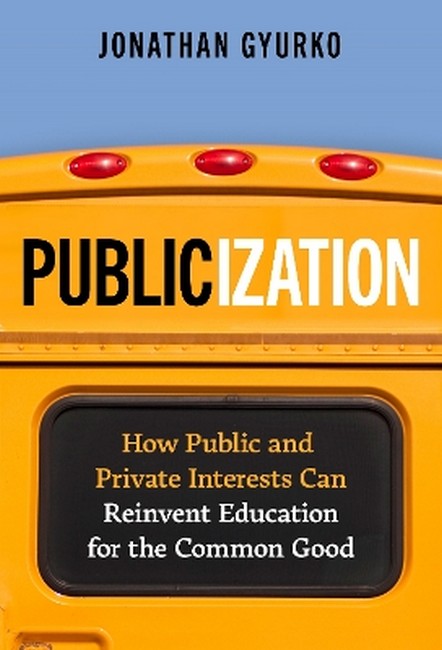Jonathan Gyurko is a nationally recognized education leader. He was an official at the NYC Department of Education and the United Federation of Teachers, and he served on the board of Dream Charter Schools. Gyurko was the inaugural Harber Fellow in Educational Innovation at Wesleyan University and is president and cofounder of the Association of College and University Educators.
Request Academic Copy
Please copy the ISBN for submitting review copy form
Description
Contents Acknowledgments ?xi Introduction ?1 Privatization's Antidote: Publicization ?3 The Public Good ?4 Criteria of a "Public" Education ?5 A Political Project ?6 What Makes a School "Public"? Some Personal Perspectives ?9 A Primer, a Memoir, and a Playbook ?11 The Exclusion Test ?13 Part I: Criteria 1. ?Funding ?19 Private Interests Remain Entrenched ?21 The Strengths and Limits of Judicial Remedies ?23 A Question of Fairness ?28 2. ?Facts and Beliefs ?29 School Choice, Private Beliefs, and the Risk to Public Goods ?30 The State's Disreputable History in "Making" Americans ?31 The Risk of "Working It Out at the Polls" ?33 Facts as a Measure of a School's Publicness ?34 3. ?Governance ?37 A Framework for Democratic Education ?38 Getting Politics Out of Education ?41 Private Interests Fill the Void ?42 "Exit" Is Not "Voice" ?45 Putting Politics Back Into Education ?46 Rules of the Road ?48 Following the Rules of the Democratic "Game," Over and Over ?49 Trust Over Time Versus Winner-Takes-All ?51 Pressure Politics: How Do We Know? ?54 4. ?Standards and Testing ?57 A Nation at Risk and the Rise of Standards ?57 Taxes Versus Accountability ?59 Economics Invades Education ?61 A Reformer's Connecticut Adventure ?64 The Wrong Lesson to Draw From a Modest Victory ?66 5. ?Accountability ?67 The Profession's Obligations ?69 Preprofessional Accountability ?73 The Polity's Responsibilities ?75 Employment Accountability ?76 School-Based Commitments ?79 Student Performance ?83 How Will You Know, John? ?86 6. ?Equity ?87 Defining Equity ?88 Structural Inequity From "The Cult of Efficiency": The Industrial Paradigm of Schooling ?89 A Brief History of Progressive Alternatives to the Industrial Paradigm ?93 The Industrial Paradigm Rewrapped: The "Cult of Innovation" ?94 For Consideration: An Intellectual-Emotional Paradigm ?94 Intellectual Capacities ?95 Emotional Capacities ?97 The Intrinsic Equity of an Intellectual-Emotional Paradigm ?100 A Political, Not an Educational, Problem ?101 Part II: Cases 7. ?Charter Schools ?107 The Publicness of Charter School Funding ?108 The Publicness of Charter School Curriculum ?110 The Charter School "Compact" and Its Complicity in the Industrial Paradigm ?112 Competition and the Conservative Agenda ?114 Charter Schools and the Teacher Unions ?115 Making Charter Schools More Public ?117 "Invisible" Versus "Helping" Hands: Community-Based Charter Schools ?118 Charter Schools and the Progressive Agenda ?121 Finding Common Ground in the Common Good ?131 8. ?Teacher Unions ?132 Education Portfolios and Competition at the Apex of Education Policy ?132 Out-Reforming the Reformers: The United Federation of Teachers ?134 The Creative Entanglements of Union-Run Charter Schools ?138 A Mixed Result ?140 A Crash Course in Labor History, Politics, and Practice ?141 Mission Accomplished? The Role of Teacher Unions in Making Schools More Public ?142 Next-Stage Teacher Unionism ?157 9. ?Conclusion ?161 What If It Comes Out "Wrong"? ?163 Making a Movement ?165 Endnotes ?167 Index ?201 About the Author ?212
"Gyurko treats both sides of the political spectrum with respect and approaches topics with positive assumptions, creating space for genuine dialogue about whether we really want public schools and how to get them." -AASA School Administrator "Jonathan Gyurko's belief that the ultimate goal of education is eudaimonia, Aristotle's articulation of human flourishing, is a welcome contrast with most contemporary books on education reform and a North Star to which many educational traditions can orient themselves." -Education Next

